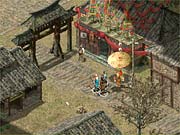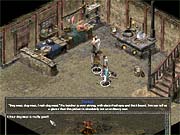Ancient China has been the setting for any number of exciting martial arts-themed Hong Kong action movies, but still, it's an era largely unknown to Western audiences. Though the Roman Empire is sometimes considered to be the first great civilization, China had been there and done that hundreds of years earlier--the Qin (pronounced "chin") Dynasty, dating back to around 220 BC, had all the token features: lots of political intrigue, social conflict, and outright war. It is in this setting that Prince of Qin, a role-playing game from Beijing-based Object Software, takes place. Prince of Qin is inspired in equal parts by popular role-playing games like Baldur's Gate and Diablo II, making for an experience that should be familiar for role-playing gamers, despite the unfamiliar setting. And though Prince of Qin is an epic adventure in the same vein as the Baldur's Gate games, a decidedly awkward English translation, some lackluster production values, and a poorly implemented multiplayer mode all prevent it from having the same appeal as the games that influenced it.

Throughout the single-player portion of Prince of Qin, you play as Fu Su, a prince living in exile. The main character of the game is actually a real historical figure, regarded as a hero of the era, but one whose life was tragically cut short by a false order demanding that the prince take his own life. The game offers up a "what if" scenario in which the prince suspects foul play when the order arrives, so rather than kill himself, he flees to investigate. In so doing, he disguises himself as a simple commoner, and then goes off on a lengthy adventure where he'll meet new allies and plenty of enemies and discover the source of corruption within the royal family. Though the characters and the places in Prince of Qin are based on historical information, for the purposes of turning them into role-playing game material, plenty of liberties were taken. The game doesn't just play it straight, but heavily incorporates magic and mysticism into the gameworld, making for a setting that's actually quite distinctive.
Those who've played Baldur's Gate and Diablo II will be quick to note that the gameplay of Prince of Qin draws directly from both these games. Though the game can be played completely in real time, you can pause the action at any point by hitting the space bar, a feature that will frequently save your characters' lives in the middle of a battle. The combat itself is reminiscent of Diablo II, in which characters gradually acquire and improve in a number of different special abilities and can equip a wide variety of different types of weapons and armor, all with various statistics and special attributes. The combat isn't nearly as polished as that of Diablo II, however. A generally haphazard pacing and some balance issues make battles in Prince of Qin not nearly so addicting as in Blizzard's hit game. Many of the skills you'll be able to learn as you gain levels just aren't useful in practice, and despite the party-based nature of the combat, it's difficult to get your characters to act intelligently in battle short of micromanaging each of them. And a somewhat counterintuitive interface interferes with the micromanagement. You can't click on one of your characters to select him, but must instead click on his portrait on the right side of the screen. Seemingly simple actions like exchanging equipment between characters are fairly cumbersome to perform.
Prince of Qin does incorporate an interesting elemental magic system, based on the ancient Chinese theory (which predates Aristotle's similar theory by centuries) that the physical world is made up of five elements: earth, fire, metal, water, and wood. A five-way rock-paper-scissors-style relationship exists between the elements in the game, making some powerful against others, but also making some able to bolster others. Certain combinations of elemental equipment produce results greater than the sum of the parts. The game also has a rudimentary trade skill system, whereby you can make new items by combining raw materials if you're proficient enough and know the proper recipe. Beyond all that, Prince of Qin is obviously similar to Baldur's Gate, insofar as this game is likewise split up into a large number of relatively small areas enshrouded in a fog of war that clears away as you move through it. Many of the areas are towns, and you'll often meet characters willing to send you on fetch quests or other simple tasks in exchange for experience points and some other rewards. Leveling up in Prince of Qin is treated much like in Diablo II, where you can spend attribute points to improve your characters' core stats, and skill points to gain or augment special abilities.
Hard-core role-playing gamers will appreciate that Prince of Qin doesn't skimp on storytelling or character development for the sake of action. There's a surprising amount of dialogue with nonplayer characters all throughout the game. Unfortunately, most of the dialogue is poorly translated, often to the point that it's difficult to understand. The occasional use of full speech is even more awkward since, in spite of the voice actors' fluency in English, their performances leave much to be desired, and the spoken dialogue itself is just as inane as the written stuff. For what it's worth, forgiving or open-minded gamers might appreciate some aspects of the translation of Prince of Qin, a game that reads like a script for a chop sockey low-budget kung fu flick.
Prince of Qin's single-player mode is fairly open-ended and is actually quite challenging, in part because you may have a difficult time keeping track of all the different characters and your various quests, but also because the combat can be very tough. It's a long campaign, and there's also a multiplayer mode to keep you busy afterward. Supposedly. The shipped version of the multiplayer game can only be played over a network or direct TCP/IP connection, making it a poor choice for those expecting an alternative to Diablo II. The multiplayer mode is different and much more action-packed than the single-player mode, and it lets you create your own character from a number of different classes, but it will also be effectively unplayable online for most gamers. At least you don't need multiple copies of the game to get it running over a network.

The game looks and sounds decent, though some aspects of the presentation are rather crude. You'll see some impressive scenery wandering through ancient China, and many of the characters look pretty good, though a lot of the creatures you'll encounter look silly, and the game generally appears grainy and washed out. Sound effects are minimal and the voice acting is poor, but surprisingly, Prince of Qin features a few really impressive music tracks that do a perfect job of setting the mood for the game. Too bad that the annoying combat theme often cuts them off.
All told, Prince of Qin is a decent role-playing game on its own merits, and it's one that's easy to apologize for considering you can tell some real effort went into it, and it was made by a relatively small team. Oftentimes you'll have to work to understand what's going on in the game, and you'll have to try hard to stay alive in battle. But if you stick with it, you'll see some interesting sights and maybe even gain a little insight into ancient Chinese culture and folklore. So if you're looking for another role-playing game to while away the time, this one's not a bad choice.